FRENCH
CINEMA
FRENCH
CINEMA
COLIN CRISP
A CRITICAL FILMOGRAPHY
VOLUME 1, 1929-1939

This book is a publication of
INDIANA UNIVERSITY PRESS
Office of Scholarly Publishing
Herman B Wells Library 350
1320 East 10th Street
Bloomington, Indiana 47405 USA
iupress.indiana.edu
2015 by Colin Crisp
All rights reserved
No part of this book may be reproduced or utilized in any form or by any means, electronic or mechanical, including photocopying and recording, or by any information storage and retrieval system, without permission in writing from the publisher. The Association of American University Presses Resolution on Permissions constitutes the only exception to this prohibition.
The paper used in this publication meets the minimum requirements of the American National Standard for Information SciencesPermanence of Paper for Printed Library Materials, ANSI Z39.48-1992.
Manufactured in the United States of America
Library of Congress Cataloging-in-Publication Data
Crisp, C. G.
French cinema : a critical filmography / Colin Crisp.
volume cm
Includes bibliographical references and index.
Contents: Volume 1. 19291939.
ISBN 978-0-253-01696-6 (vol 1 pbk. : alk. paper) ISBN 978-0-253-01703-1 (vol 1 ebook) ISBN 978-0-253-01695-9 (vol 2 pbk. : alk. paper) ISBN 978-0-253-01702-4 (vol 2 ebook) ISBN 978-0-253-01795-6 (vol 3 pbk. : alk. paper) ISBN 978-0-253-01796-3 (vol 3 ebook) 1. Motion picturesFranceCatalogs. I. Title.
PN1993.5.F7C783 2015
016.79143750944dc23
2015008318
1 2 3 4 5 20 19 18 17 16 15
Talkies and sonorised films are something entirely new. Theyre interesting inventions but I cant see them remaining fashionable very long.
Louis Lumire
Sound cinema, as it is currently practised, neglects 15 years of progress towards cinematic independence.... It is re-living, with juvenile inanity, all those errors that the silent cinema overcame.
Jean Epstein, Cina-Cin, November 1930
Lets not pretend like certain moralists that the cinema depraves us. It doesnt deprave us any more than life itself, founded as it is on profit, greed, the oppression of the weak, selfishness and injustice.
Georges Altman, a, cest du cinema, 1931
Its almost true to say that a blind man faced with a genuine theatrical work or a deaf man faced with a genuine cinematic work, though they may both lose something of the work presented to them, should not lose the essence of it.
Ren Clair, Le Temps, 18 July 1932
Lets identify some principles that will serve as
the basis of our theory of sound film:
 The silent film was the art of printingof recording and disseminatingpantomime.
The silent film was the art of printingof recording and disseminatingpantomime.
 Just as printing had a great influence on literature, the silent film [through people like] Chaplin, Gance, Griffith and Ren Clair, served to re-invent pantomime.
Just as printing had a great influence on literature, the silent film [through people like] Chaplin, Gance, Griffith and Ren Clair, served to re-invent pantomime.
 Sound film is the art of printingof recording and disseminatingtheatrical works.
Sound film is the art of printingof recording and disseminatingtheatrical works.
 Sound film... must [therefore] re-invent the theatre.
Sound film... must [therefore] re-invent the theatre.
Marcel Pagnol, Les Cahiers du film, 15 December 1933
Here we have a machine capable of devouring the known universe, and all were allowed to feed it is scraps and leftovers.
Jacques Feyder, 1946, somewhat condensed by Chavance
Carn? Just one of Prverts quainter inventions.
Henri Jeanson
Although the avant-garde in its most extreme and typical form has disappeared, it doesnt follow that the spirit of research and adventure is dead. If those who represent it no longer make marginal films its because for the most part the cinema industry has absorbed them, but has not by any means completely tamed them.
Jacques B. Brunius, En marge du cinma franais, 1954
It is impossible for a government that aspires to create a new social order to allow a means of propaganda as powerful as the cinema to remain in the hands of groups who may well have interests opposed to its own.
Paul Faure, confidant of Lon Blum, April 1936
Charlotte Lyss (Guitrys wife, at the time): I know of only two geniuses Sacha and Hitler.
St. Exupry (Later when she has left): The coming war will be far worse than previous wars, because it will be a civil war that dare not speak its name.
Carlo Rim, Mmoires dune vieille vague, regarding April 1938
Those [Jews] that settled in Paris were essentially the worst sort of scum, the lowest grade of con-men, money-grubbing parasites cold-shouldered even by their fellow Jews of any standing.
Lucien Rebatet, Les Tribus du cinma et du thtre, 1941
CONTENTS
Sans lendemain (December)
Filmed 1939, released 1940 and later |
ACKNOWLEDGMENTS
I would like to thank the Australian Research Council, for funding the purchase of the many videotapes of films without which this series of books could not have been written; Griffith University, for providing the time and the funding to visit the crucial archives in France; and Timothy Barnard, of Caboose Books, for providing the motivation to begin work on the series, and for suggesting the general format for the books and for the individual entries.

FERNCH
CINEMA
INTRODUCTION
The French Cinema in the 1930s
The decade covered by this filmography was, of course, one of the most turbulent in the history of Europe, and particularly in the history of France. The Great Depression, which affected most of the Western world from 1929, did not strike France until somewhat laterit reached its apogee in 1932but persisted somewhat longer. Coinciding as it did with the needs of the film industry to invest millions of francs in the conversion to sound, it caused a radical transformation of the industry. Politically, the implosion of capitalism that the Depression seemed to signal forced many to look elsewhere for an acceptable economic system or alternative ideology. The rise of fascism in Italy, then in Germany and Spain, together with the increased adhesion of left-leaning citizens to socialist or communist parties in the wake of the Russian Revolution, intensified debates around the government of France. The left-wing Popular Front under Lon Blum came to power in the crisis year of 1936, but the progressive disaffection that accompanied its three years in power, even among those who initially supported it, together with the fact that Blum himself was of Jewish extraction, ensured that political controversy would persist right through to the declaration of war in 1939. Then after six months of phony war, the disastrous collapse of the French Army in 1940 and the ensuing occupation would make for further national self-questioning, and impose additional constraints on the film industry as on every other area of society.
Despite this extreme turbulence, during the ten years from 1929 to 1939, France managed to produce some 1,300 films. The films in this filmography have been selected from among those. Their selection was based on two or more of the following criteria:

Next page



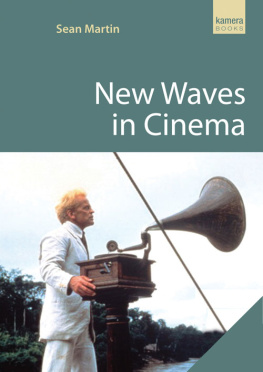
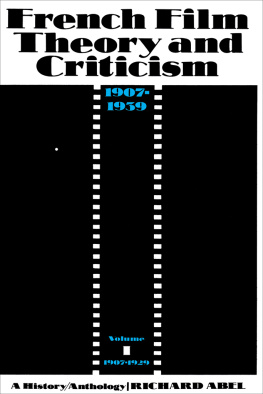
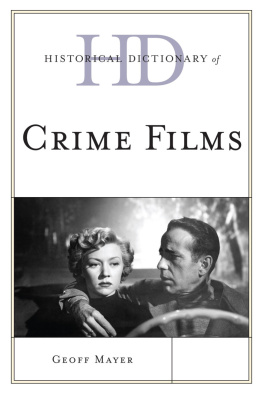


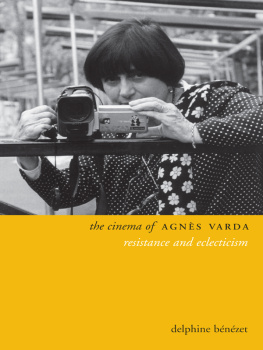
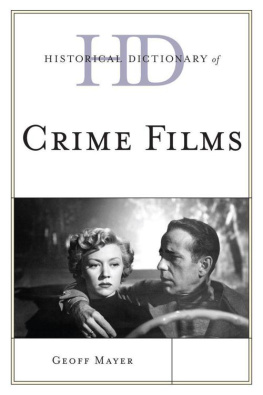

 The silent film was the art of printingof recording and disseminatingpantomime.
The silent film was the art of printingof recording and disseminatingpantomime.